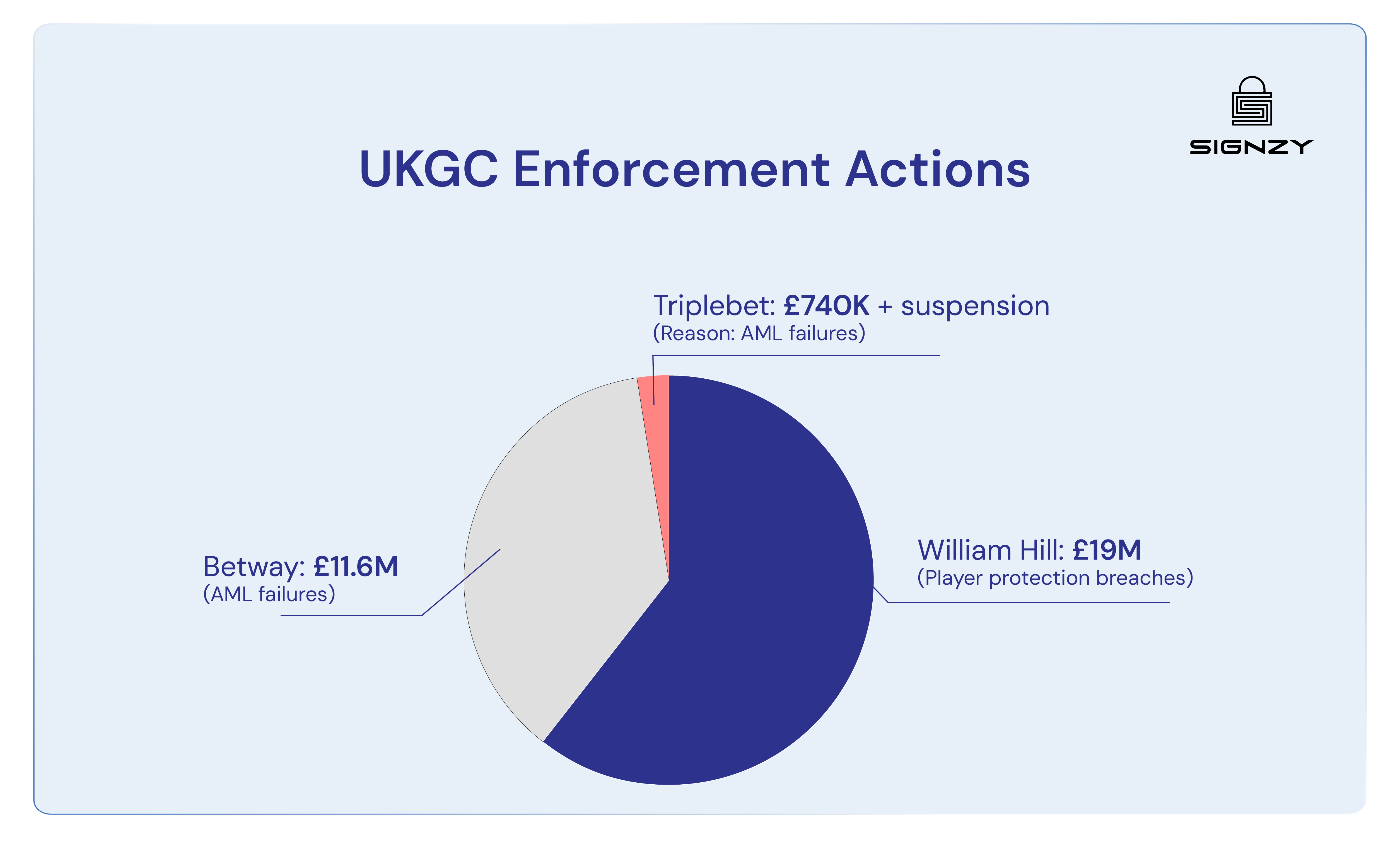Applying for UK Gambling License in 2025: Steps, Documents and More
July 24, 2025
8 minutes read
- Foreign companies can apply for gambling licenses, but they must establish a UK subsidiary or appoint a UK representative and meet all relevant regulatory requirements.
- Application fees start around £370, with annual fees varying based on your gross gambling yield. Larger operators pay significantly more in ongoing fees.
- Each gambling activity requires its operating license. You’ll need separate licenses for casino games, sports betting, bingo, and other similar activities.
So you need a UK gambling license. Great. The good news is it’s not as scary as people make it out to be.
The UK Gambling Commission basically wants to know three things: you’re not going to run off with people’s money, you know what you’re doing, and you won’t let kids gamble. Fair enough.
There are also some ifs and buts. So, if you’re looking for specifics, I’ve stacked up the step-by-step process of UK gambling licensing to make things easier for you, along with covering the types and other details.
Before anything, let’s understand some reasons to get a gambling license in the UK.
Why Apply for a UK Gambling License?
Let me explain this in simple terms. If you’re a gambling operator, you need an official clearance from the UK Gambling Commission to operate the business further. This clearance is what the license is primarily about.
Holding a UK gambling license is like having a premium standard in the industry. We know that premium things come with their benefits, just like the UK gambling licensing shows that your gambling platform protects its clients, prevents money laundering, and remains fair.
Types of UK Gambling Licenses
Now, this is where things can get a little tricky, but I’ve sorted the types so that it doesn’t become a hassle. Let’s quickly have a look at the kinds of UK gambling licensing :
1. Operating License
If you’re someone planning to set up a remote gambling operation, namely online or through any other method, in Great Britain, then this is the type you should apply for. This includes several sub-sections, such as remote, non-remote, and ancillary.
Remote and non-remote are quite understandable in their term, but who falls under the ancillary section? It’s for those who are not running the business themselves but are involved in it.
2. Personal Management License (PML)
Having this license is like a legal permission to look after the various activities such as :
- Managing
- Handling finance
- Marketing
- Technicalities and security
- Managing more than one site
- Supervising the anti-fraudulent part
Involvement in any of such roles requires a personal management license. And let me tell you about the plus point: having one PML is enough to handle all of these if you’re looking forward to doing so.
3. Personal Functional License (PFL)
Running a casino or anything related to gambling cannot be dealt with alone. Think like this: you’ve got people working on board at your casino as cashiers, dealers, pit bosses, or even security surveillance. These are the people who need a personal functional license. This allows people to work in the gambling environment. This is a point you need to check before hiring people.
4. Premises License
On-site gambling businesses like casinos, betting shops, bingo arcades, or anything similar need a premises license in the UK. If you’re already holding an operating license, then you can opt for a premises license as well.
It’s like – first, bag the green light to run the business and then get the official approval to use the place for it.
Just a reminder – age is the key. So, of course, applicants below the age of 18 aren’t allowed. This is the reason why age verification is a primary need in gambling businesses.
Documents Requirements
Now that we know all the types of licenses, let’s take a look at the list of required documents you need to apply for a permit. The following table will provide you with the list of necessary documents required for UK gambling licensing :
| Documents | Why’s It Needed |
| Business plan | It’s a primary need for the Gambling Commission to know about your gambling business, how it’ll run, and what are your future plans. |
| Financial details | This is an assurance of your financial stability, which mainly includes – bank statements, funding sources, etc. |
| Identity documents | Passports and other ID proofs are required to verify identity and run a background check to know about the key people behind the business. |
| Criminal record check | To confirm that you and your team have a clean background with zero criminal records. This is very crucial for registering a license. |
| Address proof | To check the location of your business, can provide utility bills. |
| Policies | This is to have a deeper look into your business rules and regulations. It’s a way to verify that you’re keeping things fair, safety factors, and if it’s legal. |
| Software deets | The Gambling Commission needs confirmation about the safety of the platform you’re using. Therefore, this is required. |
| Risk factor report | A report must be produced to show the possible risks of your gambling business and your plans to manage them. |
Keep the relevant documents organized so that you can use them at the time of application. Due to the online mode of application, any small mistake might lead to the dismissal of your UK gambling license.

Steps to Apply For a UK Gambling License
Remember only to use the official UK Gambling Commission website, not any third-party sites, because that can be fraudulent.
The application process comprises a total of four steps:
- Figure out if you want to open a casino, operate a remote site, or something else. Choose the license type accordingly. The types and their criteria are jotted down at the initial point of this write-up for your convenience. Once you’re confident with the type, proceed further.
- You’ve to apply online for the license through the UK Gambling Commission’s website. The other step under this includes – the submission of documents. Submit the required details; the documents to keep handy are already mentioned above.
- This step confirms your application submission. How? This is by paying the application fees, which can cost you around £370. After you pay the application fees, your application is successfully submitted for further action.
- Immediately after submission, a personnel member is appointed to assess your application, and this person might also connect with you for any further assistance.
If your application has zero problems, then it’s most likely to be accepted. The annual fees need to be paid a few days post-acceptance. And abide by the regulations to keep your business running without any interruption.
That’s pretty much it. Keep your documents ready, avoid errors, and you’ll get your official stamp to run the business.
Compliance Requirements
There are a few compliance requirements that you need to follow if you’re a gambling operator in the UK to keep vulnerable players in check and be responsible. Let’s explore the main ones.
Technical and Operational Standards
Your gaming platform needs to meet Remote Technical Standards, which means certified random number generators, tested games, proper data protection, system redundancy, and the ability to generate reports for regulators on demand.
The Commission really dislikes “open-loop” payment systems where people can deposit with one method and withdraw to another. They want “closed-loop” systems where money comes and goes through the same route – it’s much harder to launder money that way.
Anti-Money Laundering and Financial Crime Prevention
Every operator needs comprehensive AML risk assessments that get updated whenever you change products, payment methods, or business operations.
The Commission has been cracking down hard on emerging threats like:
- AI-generated fake IDs
- Payment systems that let money flow in and out through different methods
- Fraudsters use stolen personal data to open accounts.
You’ll need dedicated compliance officers with Personal Management Licenses for AML functions.
Anyone handling suspicious activity reporting or running your AML program needs a PML – this became mandatory in November 2024 for all but the smallest operators.
Player Protection and Social Responsibility
Player protection has moved way beyond basic self-exclusion tools. You need systems that spot problem gambling patterns and step inappropriately. Online operators must track at least seven specific risk indicators and increasingly need to verify that high-spending players can actually afford their gambling habits.
Age verification has to be bulletproof – if minors slip through, you’re refunding stakes and void bets.
You might start struggling at this as well once verification volumes hit any real scale. Checking documents manually gets old fast when you’re doing hundreds per day.
You can use verification APIs to speed things up – Signzy’s system can handle the ID checks and document verification automatically, which frees up your compliance people for actual problem cases.
It’s worth checking out if you’re drowning in manual reviews. To know more, check here.
FAQs
Can I operate while my license application is being processed?
No, you cannot offer gambling services to UK customers until your license is approved and issued by the UKGC.
Are there ongoing compliance requirements after getting licensed?
Yes, including annual reporting, AML procedures, responsible gambling measures, technical standards compliance, and paying annual fees and the gambling levy.
What's the difference between remote and non-remote licenses?
Remote licenses cover online gambling operations, while non-remote licenses are for physical venues like casinos, betting shops, and bingo halls.
Can I transfer my UK gambling license to another company?
Licenses cannot be transferred. The new company must apply for its own permit and meet all UKGC requirements independently.













